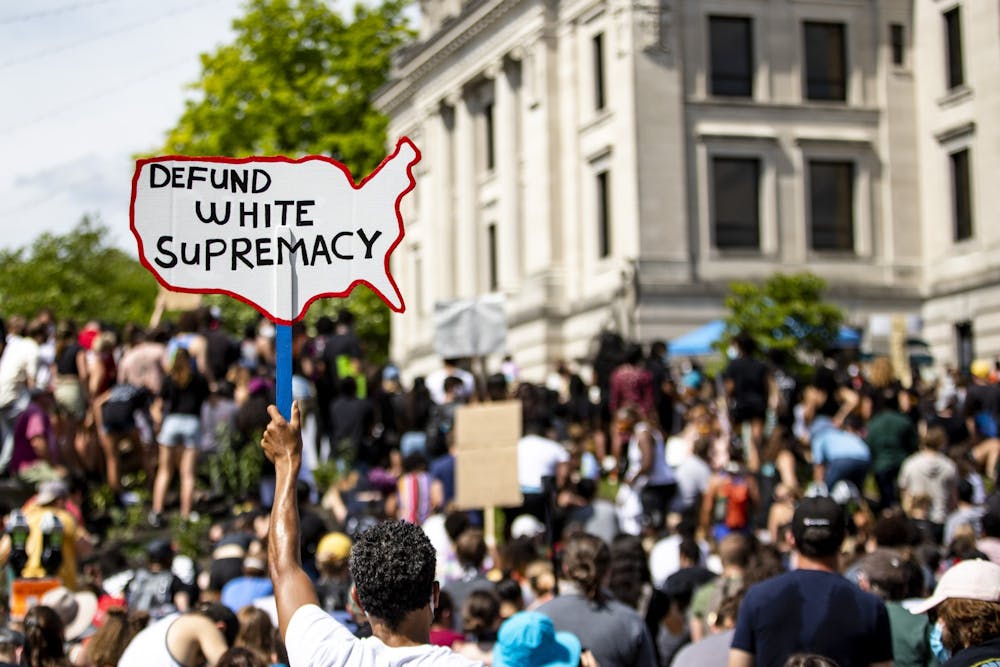Events of the past year, including a national reckoning with racial injustice, have sparked a desire for change and an increase in activism across the U.S. IU students entering criminal justice and social work fields shared how they want to enact change in the future through their professions.
IU sophomore Ronald Bearer III said ever since he was a little kid, he always wanted to help people. Through studying social work and criminal justice, he said he aims to help others through making change within law enforcement.
While there are good examples of cops, he said, they can be overshadowed by cops that historically have put people of color in danger. As a biracial person, Bearer said he’s had worry instilled in him about how to interact with cops.
“Being biracial, it’s like, I remember not being allowed to drive until I could prove to my mom that I knew how to respond to an officer in the best way possible to hopefully not get shot,” Bearer said.
Bearer said a large percentage of police officers work for departments in communities they don’t live in. This means, for example, a community could be predominantly Black with a predominantly white police force. Since Black people are often set up to fear the police, Black people aren’t as likely to become police officers, Bearer said.
Bearer said there are also lots of ideas within police departments about separating police from community members, which can be harmful when patrolling communities with different cultures. Some police officers only interact with certain races and cultures to patrol their neighborhoods, Bearer said. When they aren’t involved with the community outside of that, it creates a divide.
He said one problem with the current system is that there are few resources to call for help when police aren’t necessarily needed. There should be teams for mental health support and for situations like domestic disputes, he said.
IU senior Bethany Murray, who is studying social work, said they don’t feel social workers should work directly with police because it could be hard for social workers to not get into the same aggressive mindset as police.
Murray, who wants to work with LGBTQ youth as a therapist, said social workers could be effective advocates in other situations, like for people experiencing homelessness.
They said there is a lack of community resources available for LGBTQ youth, and much of this scarcity is because community members need to be educated.
“Just being accessible to them and creating a space where they can really be themselves and feel like they’re supported and being accepted for who they are,” Murray said.
Murray said they’re concerned about anti-transgender legislation introduced in the U.S. In 2021, more than 30 states have introduced legislation targeting transgender people. Some states have proposed bills to ban doctors from providing gender-affirming health care to transgender minors.
“Trans health care for kids, that stuff can be reversible, but if we lose those kids because they don’t have access to it, we can’t reverse that,” Murray said. “Trans health care is suicide prevention for these kids.”
A study published in the medical journal Pediatrics in January 2020 found that transgender people who received gender-affirming treatment have lower odds of suicidal ideation compared to people who did not receive treatment.
Abe Plaut, who will be a senior next fall studying sociology, said if there’s one social justice issue they’d change, it would be to end the war on drugs.
“It shouldn’t have been constructed as a criminal problem,” Plaut said.
Ending the war on drugs could change some of the most dangerous forms of policing, they said, such as people getting pulled over or police investigating homes out of an assumption of guilt.
They said it’s absurd recreational and medical marijuana are now legal in some states, while people are serving prison sentences for marijuana convictions in others.
Over the summer, Plaut was involved in an online social justice event where formerly incarcerated people spoke about their experiences. Plaut said the event grounded the issue of mass incarceration in humanity.
Plaut said they think the U.S. jails too many people. They said more emphasis should be placed on home confinement, also known as house arrest, and cash bail should end because it criminalizes poverty.
Plaut also said there’s been movement to stop prosecuting crimes like drug possession.
Plaut also said there have been encouraging developments, such as the introduction of the George Floyd Justice in Policing Act. According to Congress, the George Floyd Justice in Policing Act, if passed, would increase accountability for law enforcement misconduct, restrict the use of certain policing practices, enhance transparency and data collection and establish best practices and training requirements.
Plaut said activists have shown increased momentum by leading marches and protests. They said their own education has made them more aware of their role in making change.
“I think with that sustained energy, there hopefully will be more movement on some of these issues,” Plaut said.






